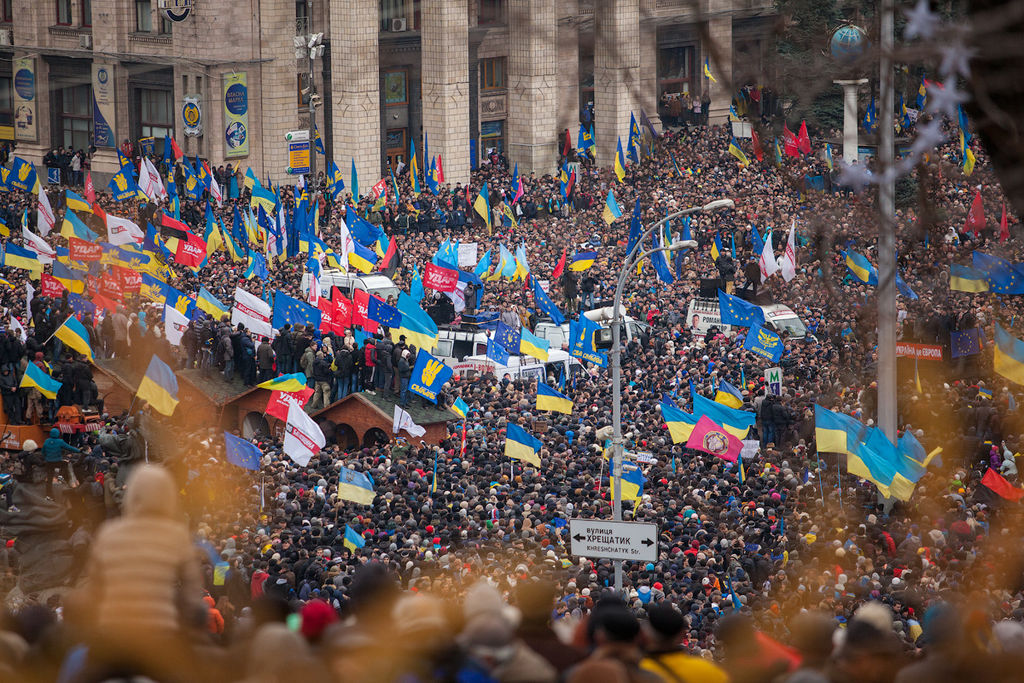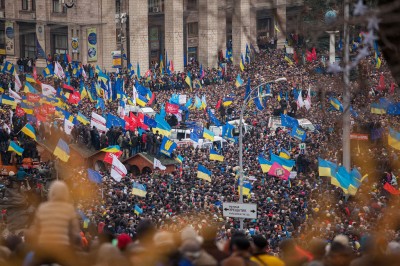Ukraine underwent some serious changes since the beginning of 2014. Its people forced the then acting President Victor Yanukovych to flee the country and demanded fundamental changes in almost all spheres of political and economic life. When the new president was elected and new government appointed, the legitimacy of the Parliament which fulfilled every whim of Yanukovych came into question. One of the main promises of Petro Poroshenko during his presidential campaign was to call for early Parliamentary elections with open lists.
After his solid 55.9% first-round win in the Presidential elections, Poroshenko started plotting the possible ways of dissolving the Parliament which lost all its credit of confidence for being a passive and Yanukovych-obedient player before and during the Ukrainian Maidan revolution. In the end of July, post-Yanukovych coalition broke up and in the end of August, President Poroshenko signed a degree dissolving the Parliament. Now, the days of the current Ukrainian Parliament that voted for so-called ’16 January Draconian laws’ starting the bloodshed at Maidan protest and later legalized Ukrainian interim government, are coming to an end. Snap parliamentary elections are to be held on the 26th of October. On the eve of the parliamentary elections the Ukrainian civil society asks several questions. First, which electoral system will be used? Second, will there be a way to filter ill-famed MPs? Third, will the young Maidan activists supplant the chairs of odious figures?
The Poroshenko’s promise of proportional election system with open lists didn’t come true. Verkhovna Rada (the Ukrainian Parliament) failed to even put the three bills on reforming the electoral system on the agenda. The laws would have introduced open list proportional representation system, cut elections spending, and lowered the threshold for parties’ getting into the Parliament to 3%. The lustration law was adopted by Rada, though it took three voting attempts and an angry crowd outside the Parliament building that started burning tires. After a long public and governmental discussion and powerful resistance it seems that the bill has overcome all the hurdles. On 2nd of October, President Poroshenko assured that he would sign it without hesitation. However, the lustration bill has little to do with MPs. According to the text, the elected bodies of the power do not come within the purview of the lustration bill. In sum, the elections will be held under the old law with no restriction for those who supported Yanukovych or were involved in corruption schemes; half of the deputies will be elected from party lists, another half – in majority constituencies.
Despite the slow motion of the Ukrainian reform, the October elections do not promise to be of the same political quality as the previous ones in 2012. May 2014 Presidential elections were a massive game-changer. Ukrainians seem to overcome their historical and linguistic divides. Facing the common problems – the war in the East and enormous state expenditures that followed – Ukrainians elected the president in the first round, sparing the money that would have gone for the second round-off. The traditional West-against-East populist rhetoric used by all political elites at every election has been palpably replaced with rather earthly economic and anti-corruption one. Political parties now are rather eager to offer peace and economic prosperity than additional language rights. Consequently, significant part of the voters finds themselves contemplated. The latest September joint poll by the Ilko Kucheriv Democratic Initiatives Foundation (DIF) and the Kyiv International Institute of Sociology (KIIS) shows that 29% of Ukrainians have not decided yet which party to vote for and 22.5% of the respondents will not take part in elections at all.
Peculiar is also the fact that all the winners of previous parliamentary elections have lost most of their supporters. The voters of UDAR party have switched to the Petro Poroshenko Block, as Petro Poroshenko Solidarnist party and UDAR united to become one political conglomerate before 2014 presidential elections and kept the union until now. Batkivshchyna lost 85% of its supporters but still has a chance to pass a 5% threshold. Rightist party Svoboda is not likely to beat the threshold as it disappointed its voters with discrepancy of party’s radical rhetoric and modest deeds. It lost 76% of its voters. Though, it still has chances to win few seats at the local majority constituencies elections. The winner of the previous 2012 Parliamentary elections – Party of Regions will not take part in the elections at all. As it gave political career to the bloodstained ex-president Yanukovych and is seen as a main culprit of the murderous events on Maidan in February 2014, Party of Regions lost 97% of its voters. Most of its MPs left the party as soon as Yanukovych fled Ukraine in attempts to dissociate themselves from the previous regime and to have a political future. The Opposition block (headed by Yuri Boiko) and Strong Ukraine (headed by Sergiy Tigipko) parties, the main successors of the Party of Regions, have mere chances of reaching the threshold. The Communist Party of Ukraine (CPU) lost 67% of its voters – the least of 2012 winners. Nevertheless, the latest poll put CPU below the threshold – at 3%. Given their downtrends and a case against them opened by the Justice Ministry, these elections may be the last elections in the history of the Ukrainian communists.
Generally, among those who decided to vote, the biggest support will get Petro Poroshenko Block (26.9%), Oleh Liashko Radical Party (6.2%) and Batkivshchyna party headed by Yulia Tymoshenko (5.5.%). Parties like Hrytsenko’s Civic position (4.6%) and Yatsenuk’s People’s Front (3.9%) are quite likely at least to pick the needed 1-2% from undecided voters. While the leading position of Petro Poroshenko does not evoke further questions, the rating of Oleh Liashko’s party is a bright example of radical populism success in Ukrainian politics. For Mr. Liashko it is the third consecutive parliamentary term. He is famous for bringing a cow to the parliament or for eating soil during his speech while addressing the parliament, but not for any law-making activities. Nonetheless, he gained enough popularity to make his party the second biggest party in the Parliament.
The civil society demand for the young new faces that became very familiar during and after the Maidan revolution has been partially satisfied. Famous pop stars on the party lists that drew attention of an average voter have been effectively substituted by Madian and war heroes. Basically, every big power that is likely to be present in the new Parliament put Maidan and war activists high on its list. Colonel Yuliy Mamchur, who became famous during Crimean crisis holds number 8 and investigative journalists Sergii Leschenko and Mustafa Nayem hold number 19 and 20 respectively on the list of the Petro Poroshenko Block. Nadiya Savchenko, Ukrainian air-force pilot currently imprisoned in Russia, is number one and the Maidan and famous Kyiv city activist Igor Lutsenko is number 3 in Batkivshcyna party list. First 20 of Hrytsenko’s Civic position party includes members of Democratic Alliance famous for their resourceful protests and Vitalii Shabunin, a founder of Anticorruption Action Centre that works on bringing the money stolen by Yanukovych clique back to Ukraine. Famous Maidan activist and former member of National Security and Defence Council Vitoria Sumar is number 7 in Yatsenuk’s People’s Front. Hanna Hopko, the charismatic and very energetic leader of Reanimation Package of Reforms (an organization that brings together experts in different spheres to advise to the government) is heading the list of young Samopomich party. There are many others.
At their joint press-conference most of the above-mentioned activists announced that they would create interfactional group to work on and lobby the political reforms such as: proportional representation with open party lists, transparency of political parties’ financing, anticorruption initiatives. Such format of cooperation should build a bridge between internal party politics and civil society. Sergiy Leschenko, leading Ukrainian journalist and most likely a future MP, believes that internal party collusions (especially within the ruling party) will fade to history, as at every party meeting there will be one or few MPs of new generation, former yet still devoted members of civil society. One may agree or disagree with the eagerness and honesty of the Maidan activists. What is beyond doubt, is their reputation they earned by monitoring and informing on the state political activities, fighting against illegal city constructions, revealing corruption schemes etc. Thus, if there is a public demand for new generation of politicians there are definitely no better candidates now than Maidan activists.




